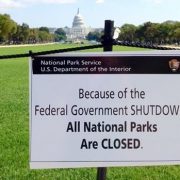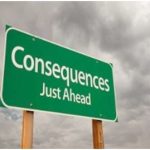The Government Shutdown is Worse Than You Think
I am rapidly coming to the depressing conclusion that the government shutdown, now in its 15th day, is going to have a far greater impact on the economy than most economists realize. When the markets figure this out, the result for share prices could be dire, putting my entire yearend bull case at risk.
My earlier forecast was that 0.5% of GPD growth would get shaved from this quarter and then get tacked on to the next quarter (click ?Say Goodbye to the Washington Discount?). Now I am starting to wonder if the entire affair could generate a net loss of business activity.
I have been dealing with the federal government for 45 years. It is vast and often invisible, impacting our lives in a million different ways. Losing it involves a lot more than just shutting down a few national monuments. The only way to discover its true size is to close it all down, and then see where the chips fall. Falling they are, big time.
I have been keeping a tally of the countless, unforeseen ways the shutdown is affecting us. I list below some of the highpoints:
*All real estate transactions have ceased. Escrow agents can?t close deals because they are unable to independently verify social security numbers. This accounts for about one third of our current economic growth. Expect the housing numbers to be horrific for the next several months.
*All federal refinancing of home loans has stopped, about 95% of all residences bought on credit. Only the 30% purchased through all cash deals can close, but only if they can resolve the social security number problem noted above.
*US companies are about to report better than expected Q3 results, which ended on September 30. But what of the guidance going forward? Will it be based on more of the same, or a return of the Great Recession? Beats me.
*San Francisco Bay is slowly filling up with ships from Asia. Without adequate numbers of customs officials, cargos can?t be landed, leading to the layoff of longshoremen and truckers. This will play havoc with our trade figures.
*The overnight money markets have started to seize up. JP Morgan and Fidelity have ceased buying all Treasury securities with October maturities to prevent their own money market funds from going into default. As a result, annualized yields on this paper have soared from 1 basis point to 30. The consequences of this are spreading to other markets by the day.
*Both the Chinese and Japanese governments, each own about $1 trillion of Treasury securities, have already warned the US not to delay interest payments. Without their participation the yields on the ten year Treasury bond could rise as much as 100 basis points, adding $150 billion a year to America?s debt service cost.
*Half of all Air Force pilots have been grounded because they can?t maintain their flight hours. I sure hope any of our enemies aren?t contemplating a surprise attack.
*Naval ships on both coasts have had missions delayed or cancelled. That leaves tens of thousands of sailors and Marines trapped ashore. You would think this would be good for local business, but it isn?t. They don?t have any money, since they are no longer getting paid.
*The great news is that your IRS audit this week has been cancelled. This is sure the cause government revenues to fall.
*There was a great emptying out of Yosemite National Park in California. Long caravans of senior citizens driving recreational vehicles, the only campers this time of year, were evicted from their views of Half Dome and El Capitan by park rangers. Harder hit are east coast federal parks and monuments that rely on the autumn leaves for most of their annual business. For many micro economies adjacent to government facilities the Great Recession has already returned.
*Fishermen around the country are confined to port because the federal officials who monitor fishing quotas have been furloughed. The price of Dungeness crab in San Francisco is skyrocketing, as the short season could end by the time the government returns to work.
*For the first time in 200 years, the clock at the entrance to the Senate has stopped. The workers responsible for winding it were laid off.
After derisking my portfolio and chopping most of my positions last week, I felt like an idiot when markets then flew. Looks like I?ll be a dummy for only a day. With no resolution in sight this morning, the cash on my balance sheet is looking pretty damn good. That gives me more dry powder when we finally hit bottom. As I never tire of telling my readers, there is no law that says you always have to have a position.
The saddest thing is that this crisis is happening just as the economy was up shifting gears from mediocre to moderate growth. The Tea Party may end up strangling something in its crib. However, it will be not the size of the US government, but our nascent economic recovery.
Try selling that to the voters.




